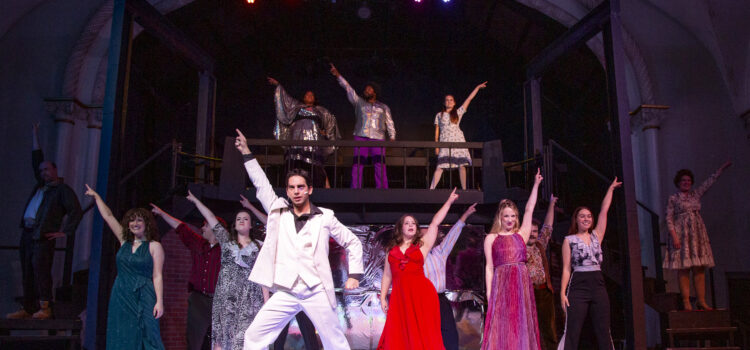By Lynn Venhaus
Ah, the rose-colored glasses that we view our youth through can differ, depending on what generation, but one thing we have in common: the nostalgia for the music we came of age listening to, whether it was the Boy Bands of the late ‘90s, the MTV New Wave in the ‘80s, the British Invasion of the ‘60s or the short-lived disco-dance craze of the 1970s.
Today’s electronic dance music has roots in those syncopated rhythms that topped the charts some 45 years ago. If you were ever grooving to up-tempo hits at a nightclub, then the stage musical version of the 1977 cultural phenomenon film, “Saturday Night Fever,” is for you.
The jukebox musical, adapted in 1998 for London’s West End, which made it to Broadway the next year, features the legendary hits from the Bee Gees, plus other classic disco tracks – who can forget The Trammps’ “Disco Inferno” — “burn that mother down.” Most of the time the actors sing the chart-toppers.
Providing many funky sounds of the day is live-wire Chris Moore as the Afro-coiffed DJ Monty, rocking gold platform shoes and a shiny silver shirt, with Jade Anaiis Hillery belting out a few tunes like she was Chaka Khan. As Candy, she leads on the aforementioned “Disco Inferno,” plus sings “Night Fever” and “Nights on Broadway.” The pair duet on “More Than a Woman.”
Side note: I heard Yvonne Elliman’s “If I Can’t Have You” at the grocery store the other evening! To emphasize how this music has endured – have you been to a wedding reception recently? The soundtrack spawned four No. 1 singles, won the Grammy Award for Album of the Year, still ranks among the best-selling soundtrack albums worldwide, and to date, has sales figures of over 40 million copies.
This Stray Dog Theatre production is marked by a larger-than-usual band to bring the sounds alive, inspired choreography by Michael Hodges, and a star-making performance by Drew Mizell as Tony Manero. The man can strut.

While the 19-year-old character is forever stamped as the role that earned John Travolta his first of two Oscar nominations and dancing reputation, Mizell has the moves to pull off such an iconic part. His ease on the dance floor is admirable, and his extensive dance training is evident.
Mizell, whose first show at Stray Dog was an impressive performance as both Cinderella’s Prince and Florinda in “Into the Woods,” also nails the Brooklyn accent and the attitude to make the character likable.
Tony, anxious about life after high school and what his future will look like, is not content just to hang out with his goon-like pals, who seem locked in dead ends. He wants more than working at a paint store. At night, at the Odyssey 2001 discotheque, he is king of the dance floor. But at home, yeesh. His mother and father are yellers, and he can’t ever measure up to his older brother, Frank Jr., a priest.
But Frank Jr. has a crisis of faith and returns home. Another standout is Sean Seifert, a natural at portraying the brother as a good man who doesn’t have all the answers. (He also pulls off a dual role as Gus, one of Tony’s inner circle who creates other issues).
When Tony meets Stephanie Mangano, he is taken by her physicality, refinement and her desire to cross that bridge for a better life in Manhattan. With a shot to win $1,000 at a dance contest, Tony and Stephanie team up, their eyes on the prize — and eventually each other.
With sophisticated airs and ambition, Stephanie is more Uptown Girl than the kind Tony hangs out with, including his needy ex Annette, who has fallen hard for him, but it’s unrequited.
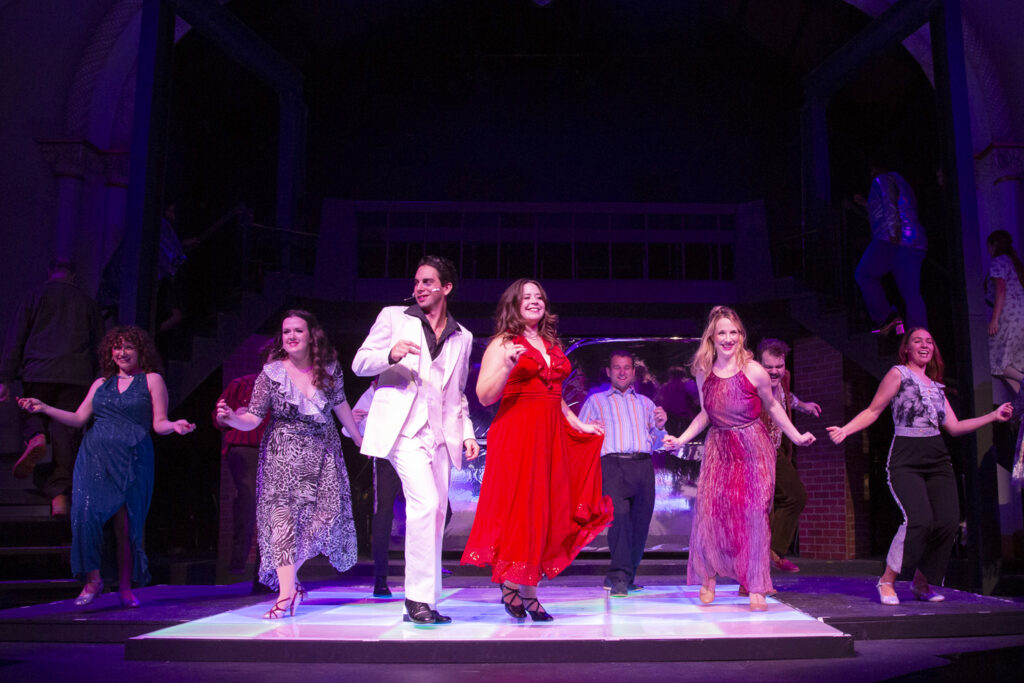
Sara Rae Womack brings out the humor in Stephanie’s images of the glamorous world, name-dropping at her entry level job, and has a solo ballad, “What Kind of Fool,” while Lindsey Grojean conveys the desperation of Annette’s lonely and confused young woman in a powerful “If I Can’t Have You,” delivering the show’s best vocals.
Triple-threat Maggie Nold is sympathetic as Pauline, who is caught up in a familiar teen pregnancy scenario. She demonstrates the realities of her situation well – but as the ensemble is handling multiple roles, it’s a tad odd to see her happily dancing and smiling soon after a funeral scene.
Ella Drake as Doreen and Kayla Dressman as Connie get their moment as dancing queens in their spirited competition number,.while Mizell and Womack hit the sweet spot with their “More Than a Woman” big dance number.
Using heavily exaggerated Brooklyn accents, the Manero family, and Tony’s peers, adhere to the stereotypes of that era, staying in those lanes. Oh, those gender caricatures — ‘hoochie mama’s and swinging playboys – were cringy then and certainly now.
Think of it as a period piece – because the best buddies are not that likable, total losers with their off-putting macho bravado, which is why the flimsy broadly-drawn book remains the show’s weakest element. Because their crude talk and bully swagger are mostly foreign in today’s ‘polite’ society, overall, this cast doesn’t seem entirely comfortable playing these roles. Now, dancing is first-rate, clearly polished and well-rehearsed.
The guys playing the deadbeat friends — Justin Bouckaert as the conflicted and struggling Bobby, Jayson Heil as Double-J and Michael Cox as Joey — are caught between a rock and a hard place because they are so immature and misguided, their idea of what manhood is, while not uncommon then, is far from what it should be. But that’s the point – to show how trouble-prone Tony is separating from the pack.
This version has cleaned up some of the more problematic “R-rated” portions of the script, as in gang-rape, violence, and intense sexuality, which is not necessary for this story. The movie’s darker and grittier aspects have been removed, for the most part, just hinted at or briefly alluded to for conflicts.
What director Justin Been does effectively is capture that malaise of the late ‘70s, when economic issues affected blue-collar laborers, and social unrest simmered in “the summer of Sam” (serial killer Son of Sam terrorized the city). The disaffected youth escaped to the discos. (“Feel the city breakin’ and everybody shakin'” — “Stayin’ Alive”).
As the one-note parents Flo and Frank Manero, pros Kay Love and Matt Anderson display their lung power shouting at their family. Nadja Kapetanovich is sincere in the brief role of Linda, the dutiful daughter put in the middle between her cranky parents and defiant brothers.
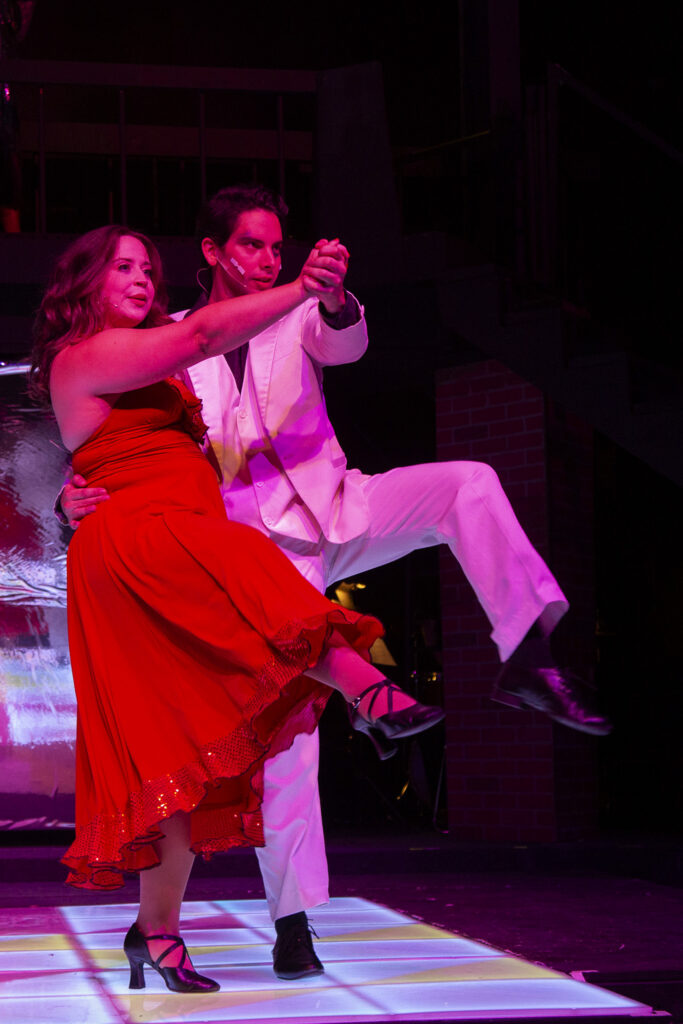
The home scenes reflect on the misery of marginalized people while the disco and dance studio are where the energy flows. But the story is really secondary to the song-and-dance appeal of the musical.
Scenic Designer Josh Smith crafted a dance floor with colored lights for the stage, with help of lighting designer Tyler Duenow, which may not be visible to all the audience members. He also expanded the Tower Grove Abbey stage with stairs and a bridge doubling for the DJ booth at the club and the Verrazzano-Narrows Bridge, a suspension bridge that connects Brooklyn to Staten Island.
They’ve made room for a large band, led by music director/conductor Leah Schultz on piano, with Marie Brown, Tai Davis, and Beau Lewis on cello for select performances, Mo Carr on trumpet, Steve Frisbee on violin, John Gerdes and Xander Gerdes on bass for select performances, Lea Gerdes and Mary Wiley on reeds for select performances, Adam Levin on trombone, Adam Rugo on guitar and Joe Winters on percussion.
Among their instrumental numbers are the classic Sounds of Philadelphia “A Fifth of Beethoven,” plus “After the Fall,” and “Salsation.”
The costumes collected by Colleen Michelson are a mixed bag – some duplicated the gaudy polyester trends of the ‘70s, while others are ‘kinda, sorta’ representative of the period. The dance floor attire, for working-class kids on weekends, needs to be faux-chic instead of Sunday church dress best. Some of the outfits were more flattering than others, and dresses had nice swirling effects. And the iconic white suit has its moment in the spotlight – always big sentimental crowd reaction.
Those infectious, danceable beats will get you on your feet every time. After all, as the Bee Gees told us – “You should be dancing” — and of course you came for the good beats that you could dance to, and don’t forget your boogie shoes. There is a Disco Mix curtain call. Dance 10, Story 3.
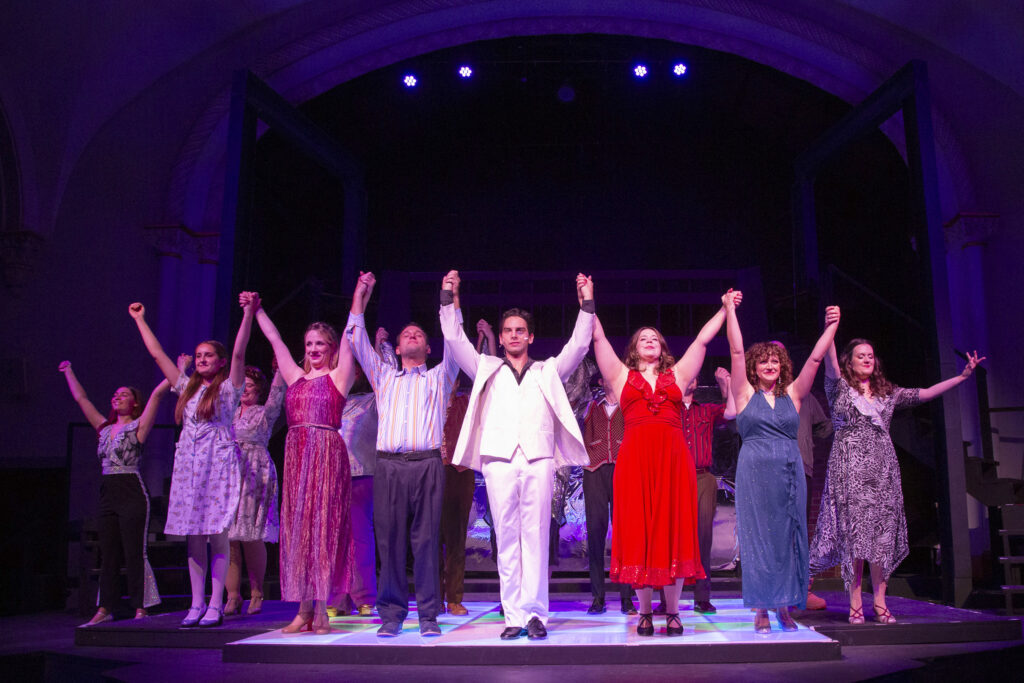
Stray Dog Theatre presents the musical “Saturday Night Fever” Oct. 5-Oct. 28, Thursdays through Saturdays at 8 p.m., with additional performances 2 p.m. Sundays, Oct. 15 and 22, at the Tower Grove Abbey, 2336 Tennessee in Tower Grove East. For more information or tickets, visit: www.straydogtheatre.org. Seating is general admission.
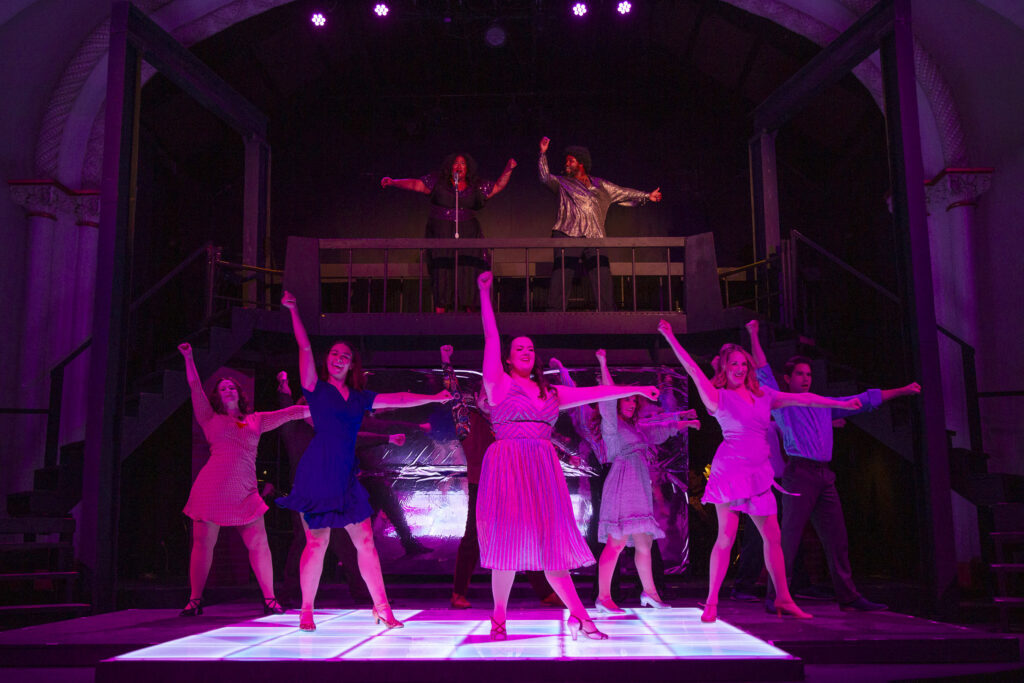
All photos by John Lamb

Lynn (Zipfel) Venhaus has had a continuous byline in St. Louis metro region publications since 1978. She writes features and news for Belleville News-Democrat and contributes to St. Louis magazine and other publications.
She is a Rotten Tomatoes-approved film critic, currently reviews films for Webster-Kirkwood Times and KTRS Radio, covers entertainment for PopLifeSTL.com and co-hosts podcast PopLifeSTL.com…Presents.
She is a member of Critics Choice Association, where she serves on the women’s and marketing committees; Alliance of Women Film Journalists; and on the board of the St. Louis Film Critics Association. She is a founding and board member of the St. Louis Theater Circle.
She is retired from teaching journalism/media as an adjunct college instructor.

